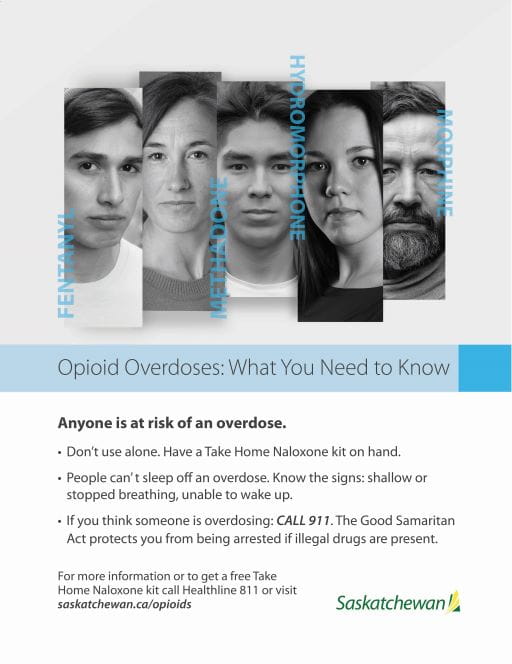Released on February 12, 2019
The Government of Saskatchewan today launched an awareness campaign to encourage people to learn the signs of an opioid overdose, know how to respond to one, and be assured that The Good Samaritan Act protects them from being arrested if illegal drugs are present when the police or first responders arrive.
“Opioids and opioid-related deaths are an increasing public health concern in Saskatchewan and across Canada,” Health Minister Jim Reiter said. “An opioid overdose can happen to anyone, whether the drugs were obtained legally or illegally. It is important to know the signs of an opioid overdose and how you can prevent one from becoming fatal.”
The Good Samaritan Act was introduced by the federal government in 2017 and provides legal protection for people who seek an emergency response to a drug overdose. The goal is to ensure that fear of repercussion does not get in the way of anyone taking action to save a life.
“You can save a life. Call 911 and use your Take Home Naloxone kit,” Reiter said.
People living with addictions are encouraged to seek treatment, and make use of harm reduction services such as Take Home Naloxone kits if they continue to use. Kits are available to people who use, their friends, family, or anyone who may witness an overdose through the Take Home Naloxone Program.

In addition to expanding the Take Home Naloxone Program, the Government of Saskatchewan has expanded harm reduction programs and opioid substitution therapy, and provides funding for the Prescription Review Program, which aims to detect the abuse and diversion of prescription opioids.
For more information on opioids, services and recovery, visit www.saskatchewan.ca/opioids.
-30-
For more information, contact:
Shelley Svedahl
Health
Regina
Phone: 306-787-4083
Email: Shelley.Svedahl@health.gov.sk.ca

